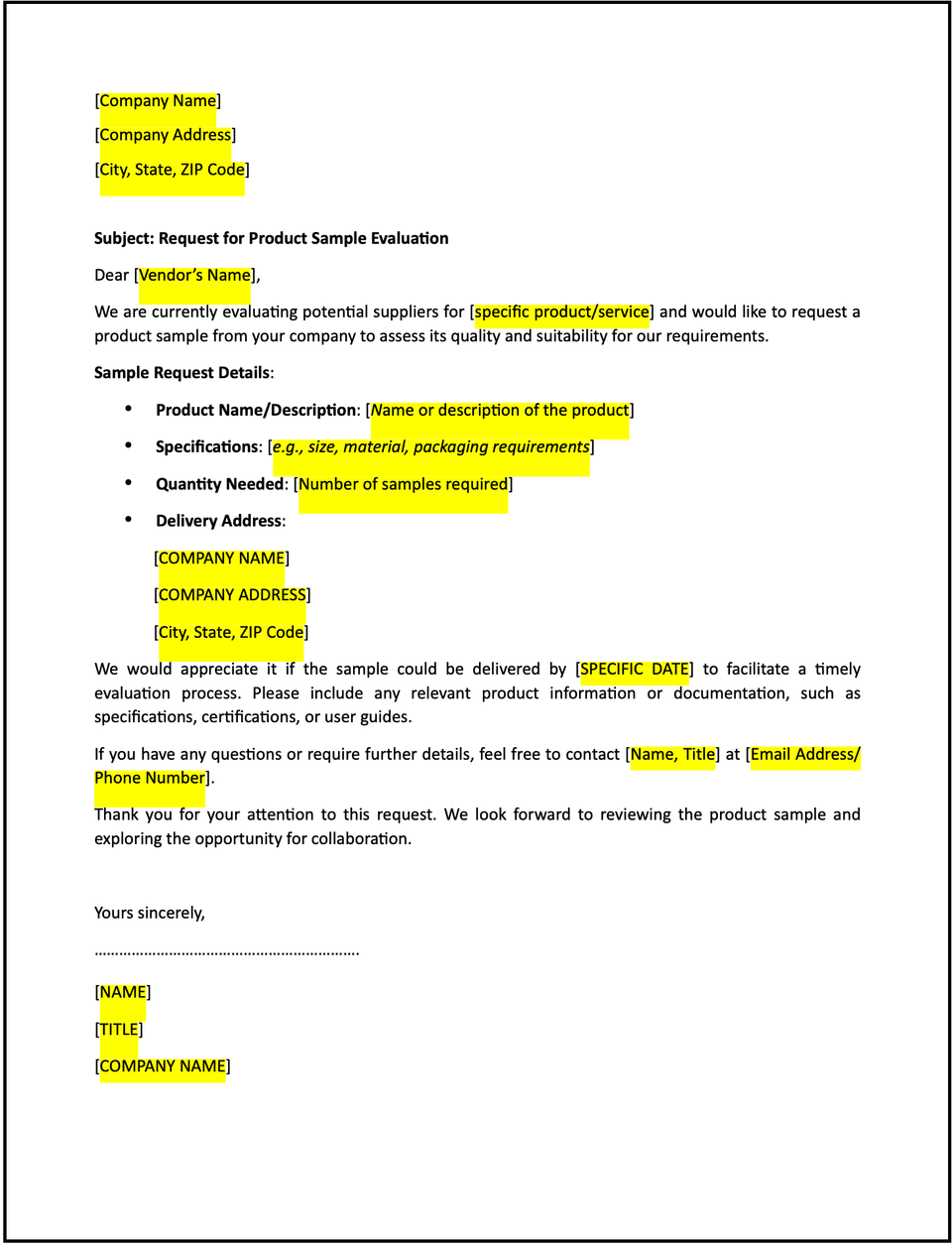Letter of request for product sample evaluation: Free template

Letter of request for product sample evaluation
A letter of request for product sample evaluation is a formal communication used to request product samples from a vendor or supplier for testing and assessment. This letter outlines the purpose of the request, the specific product details, and how the evaluation aligns with potential business opportunities.
How to use this letter of request for product sample evaluation
- Open with an introduction: Address the vendor respectfully and briefly reference your business or relationship with them.
- State the purpose: Clearly communicate your intent to request product samples for evaluation.
- Provide product details: Specify the product name, model, or SKU, and include any variations or quantities needed for testing.
- Explain the rationale: Briefly outline why you are requesting the samples, such as testing for quality, compatibility, or suitability for a specific project.
- Highlight mutual benefits: Emphasize how the evaluation could lead to further orders or collaboration.
- Include logistics: Specify any details about sample delivery, such as preferred shipping methods, timelines, or costs (if applicable).
- Maintain a professional tone: Ensure the letter is clear, respectful, and focused on fostering collaboration.
- Provide contact information: Include details for the vendor to confirm the request or discuss further arrangements.
Benefits of using a letter of request for product sample evaluation
This letter ensures a structured and professional way to request product samples while fostering trust and collaboration. Here’s how it helps:
- Promotes alignment: Clearly communicating the request ensures the vendor understands your needs.
- Reflects professionalism: A well-crafted letter demonstrates respect and strategic intent.
- Encourages collaboration: Highlighting potential business opportunities fosters openness and engagement.
- Builds trust: Transparent communication sets the foundation for a positive working relationship.
- Supports decision-making: Evaluating product samples ensures informed choices for your business.
Tips for writing an effective letter of request for product sample evaluation
- Be specific: Clearly describe the product samples requested, including quantities and specifications.
- Use professional language: Maintain a respectful and constructive tone to foster collaboration.
- Provide context: Briefly explain the purpose of the evaluation and its importance to your business.
- Highlight mutual benefits: Emphasize how the evaluation could lead to further business opportunities.
- Include actionable steps: Share instructions for confirming the request or providing the samples.
- Keep it concise: Focus on the essential points while ensuring the tone is professional and engaging.
Frequently asked questions (FAQs)
Q: What details should I include in this letter?
A: Include references to the product name or model, the quantity of samples needed, and the purpose of the evaluation.
Q: Should I personalize the letter?
A: Yes, addressing the vendor by name and referencing your business needs demonstrates attentiveness and professionalism.
Q: Who typically sends this letter?
A: Procurement teams, quality assurance departments, or business owners typically send this letter.
Q: How formal should this letter be?
A: The tone should be professional, respectful, and focused on fostering collaboration.
Q: When should this letter be sent?
A: Send the letter when you are considering a vendor or evaluating products for potential use.
Q: Can this letter include cost-sharing details?
A: Yes, mentioning who will cover sample costs or shipping fees ensures clarity and alignment.
Q: Is acknowledgment from the recipient required?
A: While not mandatory, requesting acknowledgment ensures the vendor understands and is processing your request.
This article contains general legal information and does not contain legal advice. Cobrief is not a law firm or a substitute for an attorney or law firm. The law is complex and changes often. For legal advice, please ask a lawyer.


